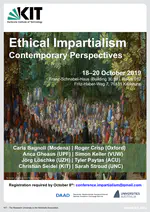The Philosophical History of Ethical Impartialism

It is often held that while we ought to give some consideration to the interests of everyone, including distant strangers, we are rationally justified in prioritizing ourselves and our loved ones. However, the idea that one ought to have equal basic concern for the interests of all has a surprisingly impressive pedigree. This view, sometimes called ethical impartialism, can be found in the teachings of the Buddhists and Stoics in the Ancient world, in Christian philosophy of the medieval period, and in modern moral theories such as utilitarianism and Kantianism.
The project aims to initiate the first extensive philosophical treatment of the history of ethical impartialism. It is a collaboration between Tyler Paytas (Australian Catholic University (ACU)) and Christian Seidel, funded by the DAAD (German Academic Exchange Service).
The project is motivated by two themes that are prevalent within contemporary moral philosophy. The first is the ongoing debate between proponents of impartialist ethical theories and those who defend partiality. The second is the worry that pervasive disagreement within moral philosophy is grounds for moral skepticism. The projekt aims to show that there is much less disagreement over impartialism within the history of philosophy than is often believed. One reason for the exaggerated perception of disagreement is that philosophers tend to associate impartialism only with utilitarianism, which is a view that has counterintuitive implications in many respects. We shall emphasize that the impartialist thread can be isolated from the rest of utilitarianism (cp. the project Impartialism), and that the impartialist element actually has substantial affinities with alternative approaches such as Kantian ethics. Further, impartialism has roots within two of the world’s greatest traditions of wisdom – Buddhism in the East and Stoicism in the West. While some have noticed the connections between these traditions, the similarities have not been adequately explored.


